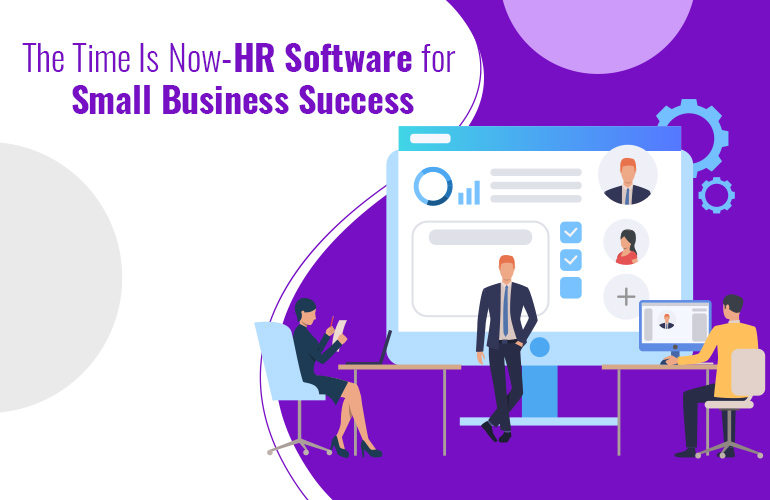In today’s dynamic business landscape, small businesses continually seek ways to enhance their competitiveness, streamline operations, and foster growth. One often overlooked but crucial aspect of this journey is adopting Human Resources (HR) software. While larger enterprises have long recognized the advantages of HR software, many small businesses tend to delay or overlook this transformative tool.
This post will explore why small businesses should no longer delay HRMS adoption.
The Small Business Dilemma
Small businesses often face unique challenges, including limited budgets, resource constraints, and the need to wear multiple hats. These constraints sometimes lead them to believe that HRMS is a luxury reserved for larger enterprises. However, this misconception can be costly in the long run.
Why HR Software Matters
Efficiency and Time Savings: Small business owners and HR managers often get bogged down by administrative tasks. HR solutions automates routine processes such as payroll management, leave tracking, and employee recordkeeping, saving valuable time that can be redirected towards strategic business activities.
- Accurate Compliance: Staying compliant with ever-changing employment laws and regulations can be daunting. HR solutions helps small businesses navigate this complex landscape by automating compliance checks and updates, reducing the risk of costly legal issues.
- Data-Driven Decision-Making: Informed decisions are the bedrock of business success. HRMS provides access to real-time data and analytics, enabling small businesses to make data-driven decisions regarding hiring, performance management, and workforce planning.
- Enhanced Employee Experience: Small businesses’ satisfaction and retention are paramount. HR solutions offers self-service portals, allowing employees to easily access their records, request time off, and communicate with HR. This improved experience fosters a positive workplace culture.
- Scalability: Small businesses often aspire to grow. Software scales with your business, accommodating an expanding workforce without substantial investments in additional HR resources.
Overcoming the Myths
Small businesses commonly hold certain myths about HRMS that delay their adoption:
- Cost Prohibitive: Many small businesses assume that HR solutions is costly. However, affordable options are designed for smaller organizations, offering essential HR functionalities without breaking the bank.
- Complex Implementation: Small business owners often dread the idea of complex software implementation. Modern HRMS providers understand this concern and offer user-friendly, cloud-based solutions that are easy to set up and use.
- Not a Priority: Small business owners often wear multiple hats, and HR might not seem an immediate priority. However, neglecting HR can lead to issues that hinder growth, such as compliance violations, high turnover rates, and inefficient processes.
The Cost of Delay
Delaying HRMS adoption can have significant consequences for small businesses:
- Compliance Risks: Failure to comply with labour laws and regulations can result in costly fines and legal consequences. HR solutions automates compliance checks, reducing these risks.
- Operational Inefficiency: Manual HR processes are time-consuming and error-prone. This inefficiency can lead to payroll errors, missed deadlines, and dissatisfied employees.
- Missed Opportunities: Without data-driven insights, small businesses may miss opportunities for growth and optimization. HRMS provides the tools necessary to make informed decisions.
Getting Started with HR Software
For small businesses ready to take the leap into software adoption, here are some critical steps:
- Assess Your Needs: Determine your specific HR needs and objectives. Identify areas where software can make the most significant impact.
- Budget Accordingly: Research HR solutions designed for small businesses and budget accordingly. Remember that the investment is geared towards long-term efficiency and growth.
- Choose the Right Vendor: Select an HRMS vendor with a track record of working with small businesses. Consider factors like user-friendliness, customer support, and scalability.
- Plan for Implementation: Develop a clear implementation plan that includes data migration, customization, training, and ongoing support.
- Embrace Change: Prepare your team to transition to HRMS by emphasizing its benefits and providing training as needed.
Embracing the Future
As small businesses face the challenges and opportunities of the future, the role of HR solutions becomes even more critical. Here’s how embracing HR software can help small businesses thrive in the evolving landscape:
- Remote Work and Flexibility: The rise of remote work and flexible work arrangements has become a hallmark of the modern workforce. HRMS facilitates remote HR management, allowing businesses to efficiently handle payroll, attendance, and employee communication, regardless of physical locations.
- Adapting to Technological Advances: Technology evolves rapidly, and staying up-to-date is essential for remaining competitive. Many HR solutions incorporate cutting-edge technologies like artificial intelligence and machine learning, enabling small businesses to leverage these advancements for better decision-making and efficiency.
- Talent Acquisition and Retention: Small businesses often compete with larger corporations for talent. HR solutions provides tools for effective recruitment, onboarding, and talent management. By fostering a positive employee experience, small businesses can attract and retain top talent.
- Scaling Operations: Every small business dreams of growth, and scaling operations can be challenging without the right tools. HRMS simplifies the process by offering scalable solutions that accommodate an expanding workforce seamlessly.
- Data Security and Compliance: With data breaches and privacy concerns rising, data security and compliance are non-negotiable. HR software providers invest heavily in data security and ensure compliance with data protection regulations, giving small businesses peace of mind.
- Business Continuity: The unexpected can happen, whether a natural disaster or a global pandemic. HRMS cloud-based nature ensures business continuity by enabling remote work and maintaining HR operations even in challenging circumstances.
Conclusion
HR software is no longer a luxury reserved for large enterprises. Small businesses benefit immensely from its adoption, including increased efficiency, compliance, data-driven decision-mak4ing, and enhanced employee experiences. Delaying HRMS adoption can result in missed opportunities and operational inefficiencies. By dispelling common myths and taking practical steps towards adoption, small businesses can position themselves for growth and success in today’s competitive business landscape.
Don’t wait—start your HRMS journey today and unlock the full potential of your small business.


